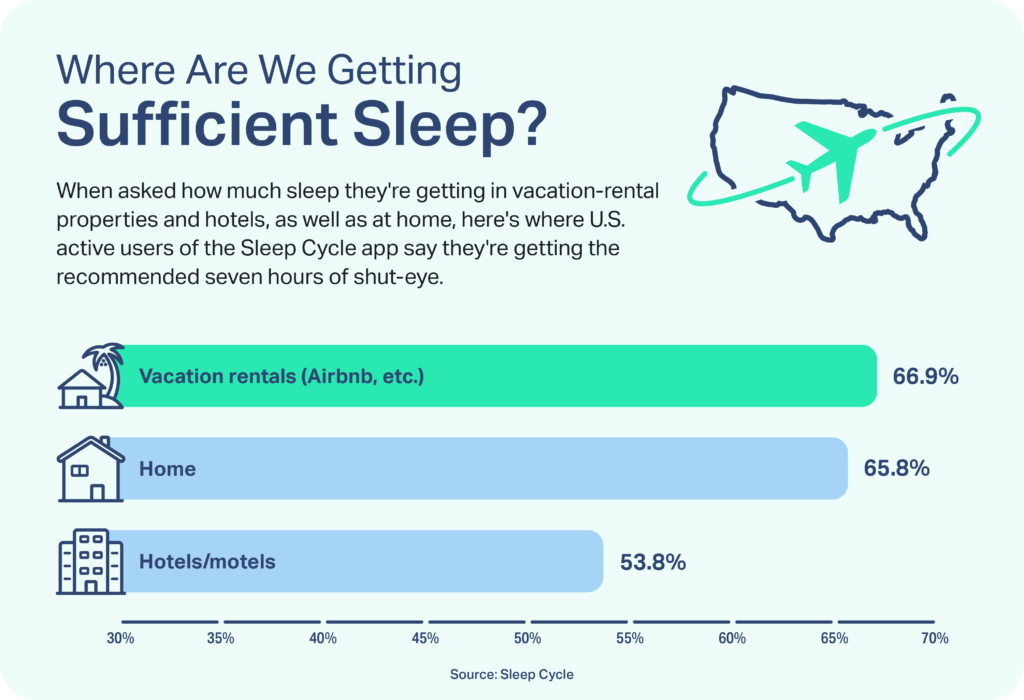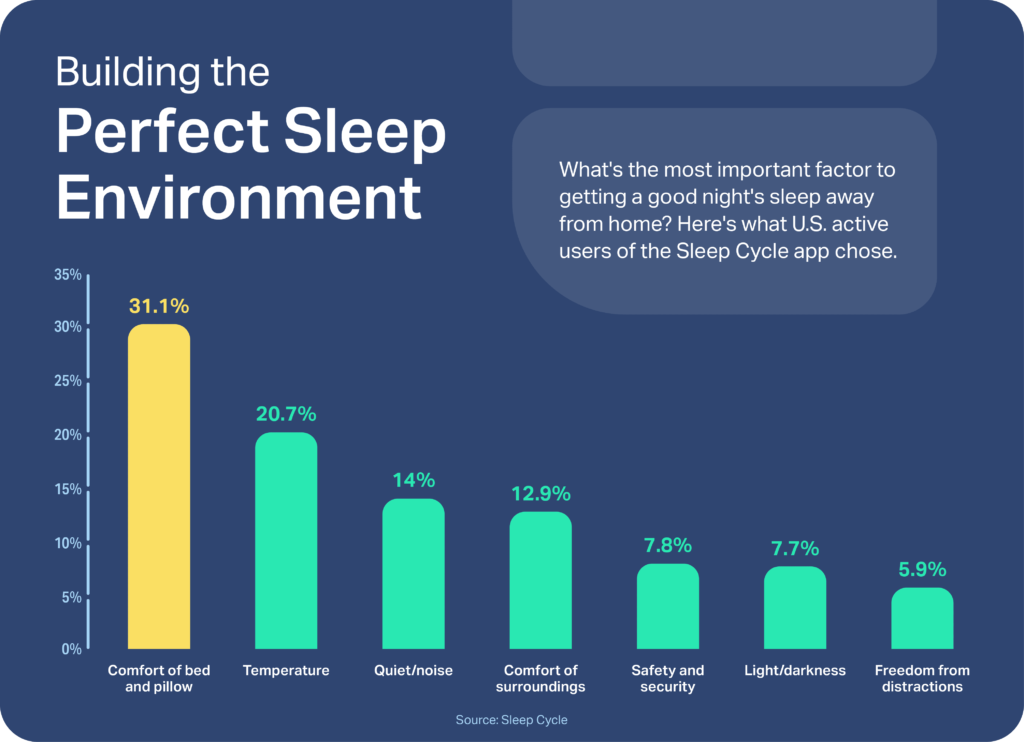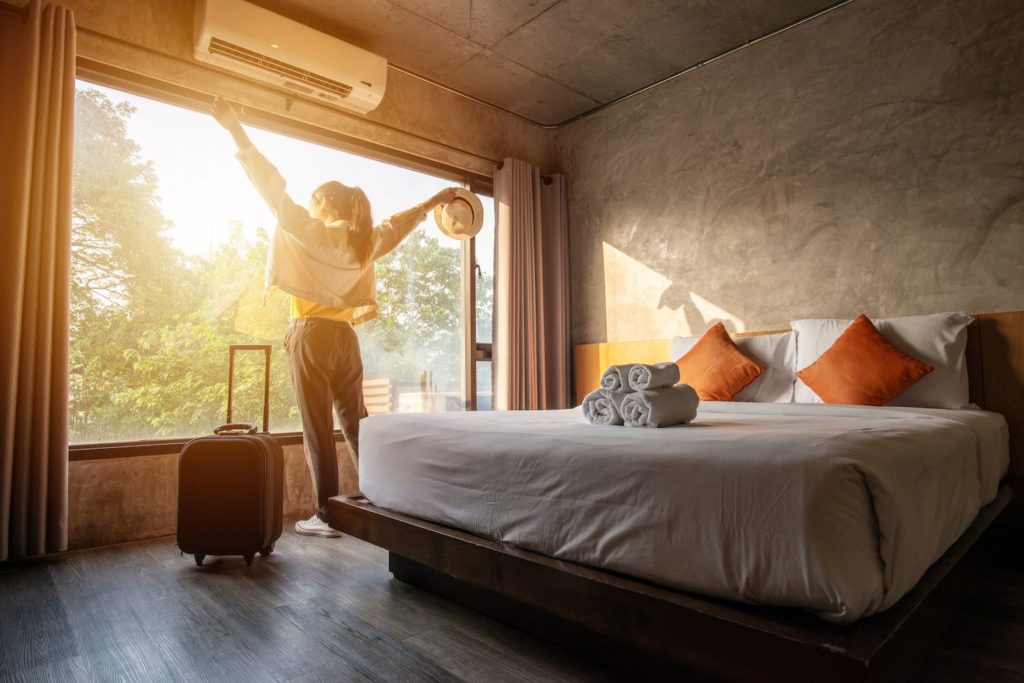Do We Sleep Better in Airbnbs or Hotels?
- 66.9% of recent travelers get at least seven hours of sleep in a vacation rental, compared to 65.8% at home and 53.8% in a hotel or motel
- 34.6% of travelers prefer vacation rentals to hotels, with 32.1% preferring hotels
- Recent travelers average 7 hours of sleep in a vacation rental, 6.9 hours at home, and 6.7 hours in a hotel or motel room
- A comfortable bed and pillow is the most important factor in getting good sleep away from home
Travel has returned to pre-pandemic levels, with many of us hitting the road for rest and relaxation. Where we’re getting that rest varies. Airbnb, for example, booked a record 103.7 million nights in its vacation rentals between April and June 2022. Large hoteliers such as Marriott International, Hilton Worldwide, and InterContinental Hotels Group all reported they were building more hotel rooms in that time frame than they were at that time in 2021 to keep pace with demand.
This got us thinking: Do we sleep better in a vacation rental or a hotel? And is there really no place like home, when it comes to catching up on sleep?
SleepFoundation.org partnered with Sleep Cycle to ask those questions of more than 1,000 Sleep Cycle app users who vacationed in the past two years. More than two-thirds of respondents, or 66.9%, reported getting at least the recommended seven hours of sleep in an Airbnb, a VRBO, or a similar vacation rental, well above the 53.8% getting sufficient sleep in hotels.
Guess what? We may sleep better in an Airbnb than at home, too, with 65.8% of respondents sleeping at least seven hours in their residence.

“People might sleep better in a vacation home because it has the best of both worlds,” says Dr. Alex Dimitriu, founder of Menlo Park Psychiatry & Sleep Medicine in Menlo Park, California, and a SleepFoundation.org medical-review board member. “It’s a home with all the conveniences, while at the same time, it’s not your usual home.”
Here’s a deeper look at why short-term vacation rentals may be getting us more sufficient sleep and how to get a good night’s sleep when traveling, wherever you may rest your head.
Why Is It More Difficult to Sleep in Hotels?
Hotels still are the top resting choice for many travelers. Nearly half (48.7%) of surveyed Sleep Cycle users say they spent at least one night in a hotel or motel room in the past two years, well above other accommodation options.
Respondents average 6.7 hours of sleep in hotel rooms, however, compared to seven hours in vacation rentals and 6.9 hours at home. When asked where they thought they slept better, 13% chose hotels versus 64.9% choosing home, with another 22.1% saying they sleep the same in both.
Figuring out how to sleep in a new place can be difficult especially on the first night. So hotels often go to great lengths to optimize sleep environments. They might have blackout curtains and high-quality bedding that’s comfortable for the majority of sleepers. They also allow for choices in rooms, pillows, and other things you can’t always customize nightly at home.
But hotel rooms can still feel uncomfortable, says Janelle Axton, a Los Angeles-based “digital nomad” who runs the Make the Trip Matter travel blog.
“Hotels, even the best ones, tend to have a feeling to them that is just not as welcoming,” says Axton, who says she has traveled to 25 countries. “You know what to expect, they are all the same, and you don’t usually have as much freedom to spread out and feel at home.”
Dry air and noise also could be interfering with getting a good night’s sleep in a hotel.
“The humidity in hotel rooms can be very low,” says Dr. Abhinav Singh, medical director of the Indiana Sleep Center in Greenwood, Indiana, and a SleepFoundation.org medical-review board member. “The air conditioning sometimes turns on and off through the night, which can be noisy for some.”
Hotels, even the best ones, tend to have a feeling to them that is just not as welcoming. — Janelle Axton, travel blogger
The distractions can add up. Among Sleep Cycle survey respondents, 45.7% say they took longer than the typical 20 minutes to fall asleep in a hotel room, compared to 41.3% in vacation rentals and 28.7% at home.
So What’s So Special About a Vacation Rental?
“A vacation rental feels more like home,” Axton says, “and we are instantly more comfortable (there).”
Comfort — especially when it comes to a good pillow and bed — was the most important factor in getting a good night’s sleep away from home per the Sleep Cycle survey, with 31.1% of respondents selecting it over temperature (20.7%), quietness (14%), and other factors.

Axton says that the option of “spreading out” in your space can help. This may be more prevalent in vacation rentals than in hotels or motels, which commonly feature single-room units. For instance, 85% of Dallas-area Airbnb rentals are for a full home or apartment, according to Inside Airbnb and the Dallas Neighborhood Coalition. Full-home listings have increased 568% there between 2016 and April 2022, according to the same report.
Getting in on the action, hotel brands such as Marriott are branching out into vacation rentals in some markets, giving travelers the best of both worlds.
Vacation rentals also can be more quiet than hotels, which may have noisy hallways. On the flipside, they also are more prone to neighboring parties and early morning lawnmowers.
How We Actually Sleep When We’re Away From Home
Perception does not always match reality when it comes to traveling and sleeping. Most survey respondents (65.7%) said they think they sleep better at home compared to a vacation rental (9.9%), for instance, though their average sleep tallies say otherwise.
Sleep habits vary by individual. Dr. Dimitriu says people with insomnia often sleep better away from their homes because “all the associations with tossing and turning may be further removed by sleeping further from the usual place of insomnia.”

Traveling itself also may have a balancing effect on sleep, according to a 2022 study. In it, researchers found that people who sleep nine hours or more on the average night at home get less sleep away from home. Conversely, people who sleep five or fewer hours at home are more likely to sleep longer when away.
“Hence, they are catching up on sleep when away from home on weekday nights,” says Sigga Svala Jonasdottir, a senior data scientist in Reykjavík, Iceland, and lead researcher on the study.
True, jet lag can make it harder to fall asleep when traveling. But short trips that don’t cross time zones can turn that restful vacation into a truly replenishing one.
Can’t Sleep on Vacation? Try These Tips
You can’t control every environmental aspect of a vacation rental or hotel. But behaviors that can help you sleep better at home may help you in a new place.
Dr. Dimitriu recommends outdoor activity and natural light to support quality sleep. He suggests avoiding alcohol and late meals that lessen sleep quality.
Also, be sure to drink plenty of water.
“Hydration is key because if you’re very dehydrated, it may cause nasal irritation, and breathing may be harder,” says Dr. Singh, adding that a quick, warm shower can help you fall asleep.
Still worried about sleeping on vacation, no matter where you’re staying? Dr. Singh also recommends keeping things as close to your home routine and environment as possible. This includes temperature and bedtime. Some travelers even bring their own pillow to allow for an extra level of comfort and that feeling of home.
Methodology
The survey was commissioned by SleepFoundation.org and Sleep Cycle and was conducted between July 13 and July 20, 2022. Results are from the completed surveys of 1,015 Sleep Cycle active users who were ages 18 and older and lived in the United States at the time of the survey. All attested to answering the survey questions truthfully and accurately.
References
8 Sources
-
Monthly Travel Data Report (2022, August 4). U.S. Travel Association., Retrieved August 8, 2022, from
https://www.ustravel.org/research/monthly-travel-data-report -
Airbnb (2022, August 2). Airbnb second quarter 2022 financial results. Airbnb Newsroom., Retrieved August 10, 2022, from
https://news.airbnb.com/airbnb-second-quarter-2022-financial-results/ -
Lodging Econometrics (2022, August 1). Marriott International Projects Lead the U.S. Hotel Construction Pipeline at the Close of the Second Quarter., Retrieved August 10, 2022, from
https://lodgingeconometrics.com/marriott-international-projects-lead-the-u-s-hotel-construction-pipeline-at-the-close-of-the-second-quarter/ -
Watson, N. F., Badr, M. S., Belenky, G., Bliwise, D. L., Buxton, O. M., Buysse, D., Dinges, D. F., Gangwisch, J., Grandner, M. A., Kushida, C., Malhotra, R. K., Martin, J. L., Patel, S. R., Quan, S. F., & Tasali, E. (2015). Recommended Amount of Sleep for a Healthy Adult: A Joint Consensus Statement of the American Academy of Sleep Medicine and Sleep Research Society. Sleep, 38(6), 843–844.
https://pubmed.ncbi.nlm.nih.gov/26039963/ -
Tamaki, M., Nittono, H., Hayashi, M., & Hori, T. (2005). Examination of the first-night effect during the sleep-onset period. Sleep, 28(2), 195–202.
https://pubmed.ncbi.nlm.nih.gov/16171243/ -
Jung, D. W., Hwang, S. H., Chung, G. S., Lee, Y. J., Jeong, D. U., & Park, K. S. (2013). Estimation of sleep onset latency based on the blood pressure regulatory reflex mechanism. IEEE journal of biomedical and health informatics, 17(3), 534–544.
https://pubmed.ncbi.nlm.nih.gov/24592456/ -
Cox, M. (2022, May 3). Inside Airbnb: Dallas. Inside Airbnb., Retrieved August 10, 2022, from
http://insideairbnb.com/reports/inside-airbnb-dallas-april-2022/ -
Jonasdottir, S.S., Bagrow, J. & Lehmann, S. (2022) Sleep during travel balances individual sleep needs. Nature Human Behavior 6, 691–699., Retrieved August 8, 2022, from
https://www.nature.com/articles/s41562-022-01291-0












































































